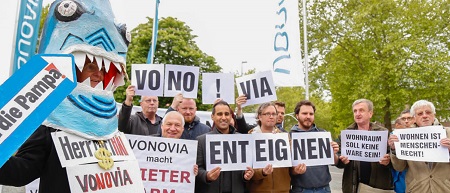Vonovia: Profiting from Crisis

The Germany-based real estate trust, Vonovia, was born from social-housing seel-offs is now the largest private landlord in Austria and Sweden, with stakes also in a French housing company. On 26 June, Vonovia announced its further expansion to The Netherlands.
Tenant activists and other critics in affected countries know well the harsh consequences of transnational corporations (TNCs) as landlords who inflated rents across Europe. They now demand a re-distribution of Vonovia’s high-rent extractions through rent caps and rent reductions, climate-just housing renewals and a solidarity fund to support social housing.
Yellow flags hang from buildings in Stockholm’s Husby District, demanding a rent moratorium. One of the most-disadvantaged neighborhoods in the Swedish capital, Husby is also heavily stricken by COVID-19. Ilhan Kellecioğlu, a tenant advisor and researcher explained, “Here in Husby I know many people who have lost their income, and who are now seriously concerned about the expenditure that comes at the end of the month. If people are forced to prioritize, the rent always comes first. Food, for example, comes second….” Meanwhile, he added, “rental debt is increasing fast.”
With the “Yellow Flag” campaign, tenants are demanding three rent-free months for those affected by the pandemic and an end to evictions by landlords in the district. Among them is the profit-driven Vonovia, operating as “Hembla.”
during the 1970s the Stockholm municipality sold social housing built in the 1970s to private owners in 1998. Lacking needed repair, the estates were bought by a Blackstone-managed fund five years ago, increasing rents incrementally with each apartment turnover. In 2019, Vonovia bought Blackstone’s Hembla portfolio, similarly raising rents by 40%, while service and maintenance remained notoriously substandard
Knut Unger, a tenant unionizer in Witten, Ruhr Valley, Germany observed “Vonovia is doing exactly the same here in our town and the whole area.” For two decades, Unger has been observing the development of the “financialized rent-extraction machines,” as he calls them. “Through tax-exempt share deals, private equity funds bought up former housing estates after 2000. Most of them were flats of the local steel industry workers,” Unger reported
Vonovia has transformed them into assets of the global financial market, extracting the rents and doing nothing for renovation. Unger explains how, after Germany’s recovery from the 2008 financial crisis, such TNCs put their housing corporations on the stock exchange. A fast concentration process followed. Capital now is invested into so called inslutation “modernization” projects that, in Germany, allow huge rent increases.
After many protests and regulatory changes in 2018, Vonovia stopped turned to limited renovations of single vacated apartments for new rental. Like in Husby, they demand rents 40% higher than comparable local apartment. Although the industrial Ruhr Region is not a hot spot of the German housing crisis, Vonovia nonetheless manages to drive up rents of formerly affordable housing.
Unger owns some Vonovia shares and, therefore, can confront the Vonovia Board with questions and countermotions at the annual shareholder meetings. This year he and other “critical shareholders” demand that the company not pay dividends, but use profits for rent reductions, climate-just housing renewals and a solidarity fund for those who lost income during the Corona crisis. He also demands that the Vonovia Board cease the continuously untransparent increase in billing for energy, gardening, and construction from one firm to the other within its complex trust structure. Unger explained, “It is like a monopoly; they dictate the prices for everything connected to housing. I fear, it is also this model and its implementation into an automated digital system, they want to export to other countries now.”
For Unger, the transnational expansion is a necessary consequence of the companies appetite for fast growth beyond its limitations in Germany. TNC landlords cannot increase rents much faster than the income forever. Naturally, new tenant movements are emerging and asserting more and more-radical demands, including the expropriation of large private landlords.
Politicians have reacted and introduced stricter regulations such as the rent cap in Berlin, but Vonovia is forced to grow and expand to satisfy the greed of the capital market. Unger warns, “Therefore, they are very keen to scale-up their financially optimized industrial model and extend it to former social housing estate in other countries.”
Original article
Photo: Renter protest action against Vonovia in Bochum, Ruhr Region, Germany. Source: Die Linke.
|